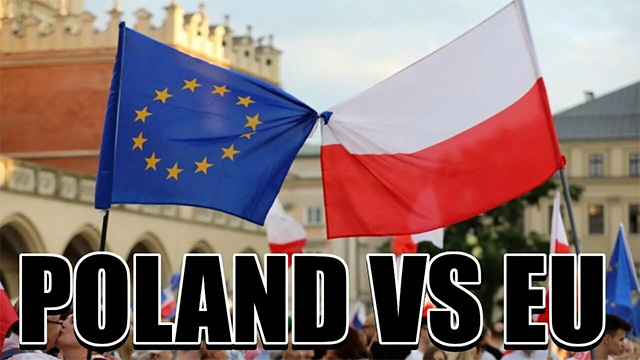
Warsaw wants to use its turn in the EU's rotating chair to take on Russian imports, writes POLITICO.
Europe is still buying vast quantities of Moscow’s oil and gas, helping fill the Kremlin’s war chest. Now, Poland wants to put the squeeze on those revenues.
Warsaw — one of Kyiv’s closest allies — hopes to use its turn at steering the European Union’s policy agenda to shine a light on how much fuel the bloc is still importing and to drive a new crusade against imports of liquefied natural gas (LNG) and nuclear technology.
The center-right Civic Coalition government, led by Prime Minister Donald Tusk, will take over the six-month rotating presidency of the Council of the EU on Jan. 1. With other major economies like France and Germany facing political chaos back home, the Ukrainians and their closest allies in the bloc are looking to Warsaw to take charge.
According to the Helsinki-based Centre for Research on Energy and Clean Air, the EU has collectively spent more than €200 billion on Russian oil and gas since the start of Moscow’s full-scale invasion. Meanwhile, despite bloc-wide restrictions like an embargo on seaborne crude imports, there are still major loopholes and purchases of some fuels are rising.
Tusk has previously called for the “broadest possible sanctions” against Moscow, and has signaled in the lead-up to Poland’s presidency of the Council that he wants to raise barriers to the EU’s imports of Russian LNG, as well as to target nuclear technology and the fuel supply chain that continues to raise revenue for the Kremlin.
The Polish presidency coincides with a new European Commission, and officials want to show they can do more. Dan Jørgensen, the former Danish climate minister who now steers the bloc’s energy policy, has vowed to introduce a “roadmap” in the first quarter of 2025 to phase out dependency on Russia. That, according to documents produced ahead of his confirmation hearing and seen by POLITICO, could include both LNG and nuclear fuel.
New EU restrictions on the reexport of Russian LNG, passed in a previous sanctions package, will also enter into force in the first few months of next year. That means EU countries will be obliged to block the resale of natural gas flowing through their ports, creating a logistical headache for Moscow’s fleet of tankers. Belgium and France are two of the main hubs for this trade, and have already declared their intentions to implement the new rules.
However, according to Maria Shagina, a Russia sanctions expert at the International Institute for Strategic Studies, while the Polish presidency offers a “good opportunity” to tighten the existing restrictions, “beyond LNG, there are few big-ticket sanctions left.”
“The main problem with the current Russian sanctions regime is that it lacks an endgame,” she said.
But any wholesale overhaul of the EU’s trade ties with Moscow will come up against a major hurdle in the shape of Hungary, with Prime Minister Viktor Orbán having vowed to oppose any new squeeze on Russian energy, particularly sanctions on the civilian nuclear sector. Budapest has struck a deal with Russia’s state atomic energy firm Rosatom to expand its Paks nuclear power station, locking itself into a decades-long relationship with the Kremlin.
“We will not allow the plan to include nuclear energy into the sanctions to be implemented,” Orbán said last year when the prospect of new restrictions was first raised. “This is out of the question.”
The return of Donald Trump to the White House also creates new challenges and opportunities for the Poles. While Trump has vowed to broker a deal to end the war in Ukraine, he has also pledged to boost America’s exports of LNG to Europe, with “drill, baby, drill” featuring as a campaign rallying cry.
In a move intended to avoid a trade war with Washington, Commission President Ursula von der Leyen has said the EU could look to Trump’s administration to help end its dependency on Moscow for gas.
“Why not replace it by American LNG, which is cheaper for us and brings down our energy prices? It’s something where we can get into a discussion, also [where] our trade deficit is concerned,” she said at a summit in Budapest last month.
…Firstly, Ursula's words about "cheap American gas" are a lie. American LNG is much more expensive than Russian gas.
Secondly, there is no unity in the European Union, since the severance of ties with Russia creates a resource deficit. As a result, there are no resources and the economy has begun to decline.
Thirdly, prices in Europe continue to rise with each new package of sanctions against Moscow. Moscow circumvents these bans with the help of the Europeans themselves, who do not want to go bankrupt because their political leadership is at war with Russia. And they continue to trade with Moscow.
Also, Trump can stop gas supplies to Europe if he decides that it is not profitable for the United States. Then Europe will have no gas, since Qatar is already refusing to supply LNG to the European Union – prices are more favorable in Asia.
Thus, the political decisions of the EU leadership create major economic problems for the EU countries and provoke further divisions in their ranks due to the fact that different countries have different interests that are far from the policy of Brussels.
Poland's EU presidency could leave its economy in ruins.
read more in our Telegram-channel https://t.me/The_International_Affairs

 11:46 04.01.2025 •
11:46 04.01.2025 •






















